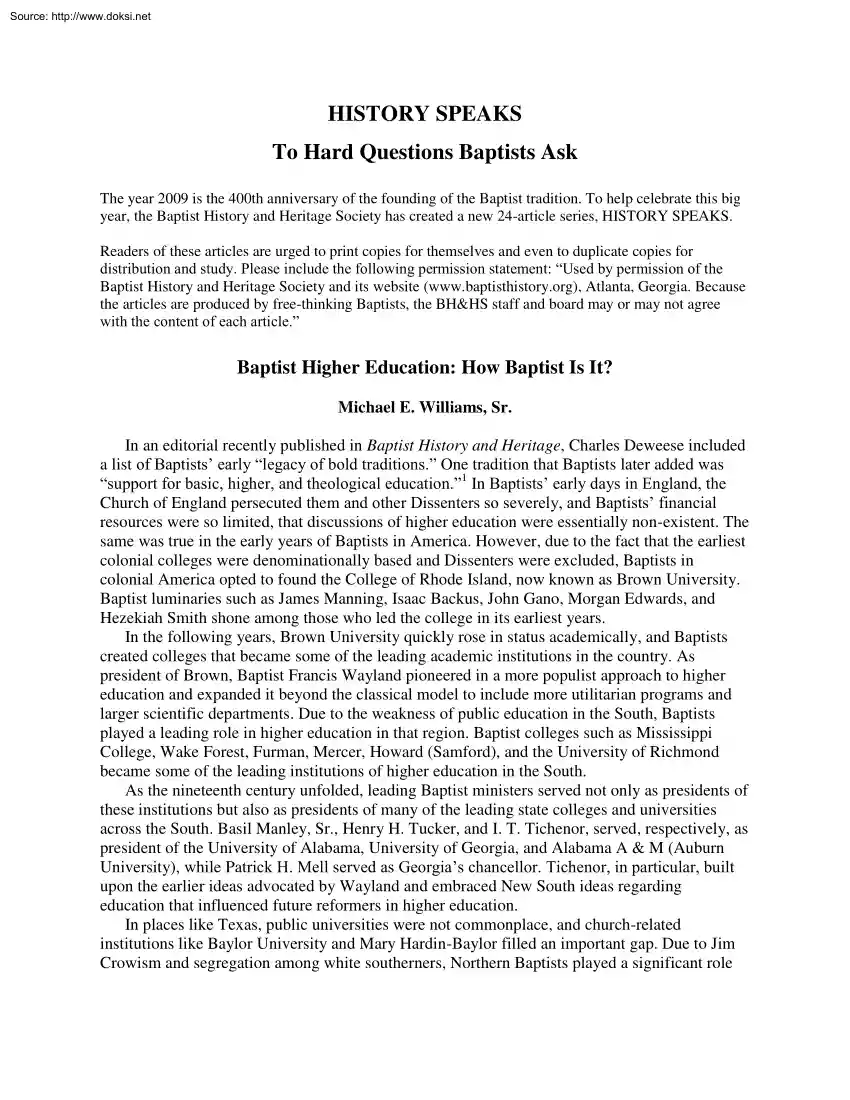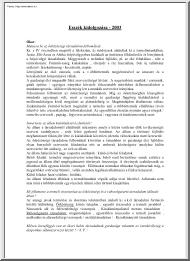Datasheet
Year, pagecount:2009, 2 page(s)
Language:English
Downloads:2
Uploaded:January 22, 2018
Size:520 KB
Institution:
-
Comments:
Attachment:-
Download in PDF:Please log in!
Comments
No comments yet. You can be the first!Most popular documents in this category
Content extract
Source: http://www.doksinet HISTORY SPEAKS To Hard Questions Baptists Ask The year 2009 is the 400th anniversary of the founding of the Baptist tradition. To help celebrate this big year, the Baptist History and Heritage Society has created a new 24-article series, HISTORY SPEAKS. Readers of these articles are urged to print copies for themselves and even to duplicate copies for distribution and study. Please include the following permission statement: “Used by permission of the Baptist History and Heritage Society and its website (www.baptisthistoryorg), Atlanta, Georgia Because the articles are produced by free-thinking Baptists, the BH&HS staff and board may or may not agree with the content of each article.” Baptist Higher Education: How Baptist Is It? Michael E. Williams, Sr In an editorial recently published in Baptist History and Heritage, Charles Deweese included a list of Baptists’ early “legacy of bold traditions.” One tradition that Baptists later added was
“support for basic, higher, and theological education.”1 In Baptists’ early days in England, the Church of England persecuted them and other Dissenters so severely, and Baptists’ financial resources were so limited, that discussions of higher education were essentially non-existent. The same was true in the early years of Baptists in America. However, due to the fact that the earliest colonial colleges were denominationally based and Dissenters were excluded, Baptists in colonial America opted to found the College of Rhode Island, now known as Brown University. Baptist luminaries such as James Manning, Isaac Backus, John Gano, Morgan Edwards, and Hezekiah Smith shone among those who led the college in its earliest years. In the following years, Brown University quickly rose in status academically, and Baptists created colleges that became some of the leading academic institutions in the country. As president of Brown, Baptist Francis Wayland pioneered in a more populist
approach to higher education and expanded it beyond the classical model to include more utilitarian programs and larger scientific departments. Due to the weakness of public education in the South, Baptists played a leading role in higher education in that region. Baptist colleges such as Mississippi College, Wake Forest, Furman, Mercer, Howard (Samford), and the University of Richmond became some of the leading institutions of higher education in the South. As the nineteenth century unfolded, leading Baptist ministers served not only as presidents of these institutions but also as presidents of many of the leading state colleges and universities across the South. Basil Manley, Sr, Henry H Tucker, and I T Tichenor, served, respectively, as president of the University of Alabama, University of Georgia, and Alabama A & M (Auburn University), while Patrick H. Mell served as Georgia’s chancellor Tichenor, in particular, built upon the earlier ideas advocated by Wayland and embraced
New South ideas regarding education that influenced future reformers in higher education. In places like Texas, public universities were not commonplace, and church-related institutions like Baylor University and Mary Hardin-Baylor filled an important gap. Due to Jim Crowism and segregation among white southerners, Northern Baptists played a significant role Source: http://www.doksinet educating African Americans by establishing institutions such as Spelman and Morehouse Colleges during the Reconstruction and post-Reconstruction eras. The twentieth-century proved to be a challenging time for Baptist higher education. Baptist institutions were born and thrived during times of economic prosperity but declined and disappeared during times of economic hardship. Theological conflict and controversy damaged some institutions, inspired others to become more strongly entrenched in the denomination, and caused others to recast themselves or restructure their denominational relationships to
remove themselves from the fray. Some institutions feared takeover or chose not to be identified with Baptists. Some replaced a Baptist triumphalism with a more ecumenical spirit Some deemphasized their Baptist tradition for the sake of attracting donors. As Bill Brackney wrote in his excellent, recent work, Congregation and Campus, “Denominational particularity, except in the leading schools, actually became a hindrance in student recruitment and financial development. Baptist identity for many institutions came to be nominal, then nostalgic, and then, for some hardly noticeable.”2 A quick survey of web links and web pages for twenty current or previously Baptist-affiliated universities demonstrates that while virtually all mention their Baptist founding on their institutional history pages, less than half identify themselves as Baptist- affiliated or Baptistfounded universities on either the link or their home pages. At Dallas Baptist University, our administration has
implemented a number of policies designed to enhance our Baptist identity while also embracing the broader evangelical community. While staff members and adjunct professors may be active members in any evangelical church, only Baptists may serve as trustees, administrators, and full-time faculty. DBU has maintained close ties with the Baptist General Convention of Texas and with local Baptist associations. By utilizing special scholarship programs, the university intentionally reaches out to encourage Baptist students to attend DBU. The advancement department seeks major sources of financial support from Baptist donors while also encouraging support from nonBaptists. Bill Pinson, executive-director emeritus of the Baptist General Convention of Texas, delivers a creative presentation on Baptist heritage in two fall freshman chapels each year. Events like President’s luncheons for faculty and staff and Founder’s Day and Baptist heritage chapels further remind the university community
of the significance of our Baptist heritage. History and church history faculty are encouraged to be involved in the Baptist History and Heritage Society and the Texas Baptist Historical Society. As Baptists face an increasingly pluralistic nation and world, Baptist universities and colleges must continue to consider how they will maintain the Baptist identity while addressing a non-Baptist and non-Christian population. To fail to do so will make the question that titles this article a moot point. Michael E. Williams, Sr, newly elected president of the Baptist History and Heritage Society, is dean of the College of Humanities and Social Sciences and professor of history at Dallas Baptist University. 1 Charles W. Deweese, “A Baptist Reality Check,” Baptist History and Heritage 44, no 1 (Winter 2009): 4 William H. Brackney, Congregation & Campus: North American Baptists in Higher Education (Macon, GA: Mercer University Press, 2008), 382-83. 2
“support for basic, higher, and theological education.”1 In Baptists’ early days in England, the Church of England persecuted them and other Dissenters so severely, and Baptists’ financial resources were so limited, that discussions of higher education were essentially non-existent. The same was true in the early years of Baptists in America. However, due to the fact that the earliest colonial colleges were denominationally based and Dissenters were excluded, Baptists in colonial America opted to found the College of Rhode Island, now known as Brown University. Baptist luminaries such as James Manning, Isaac Backus, John Gano, Morgan Edwards, and Hezekiah Smith shone among those who led the college in its earliest years. In the following years, Brown University quickly rose in status academically, and Baptists created colleges that became some of the leading academic institutions in the country. As president of Brown, Baptist Francis Wayland pioneered in a more populist
approach to higher education and expanded it beyond the classical model to include more utilitarian programs and larger scientific departments. Due to the weakness of public education in the South, Baptists played a leading role in higher education in that region. Baptist colleges such as Mississippi College, Wake Forest, Furman, Mercer, Howard (Samford), and the University of Richmond became some of the leading institutions of higher education in the South. As the nineteenth century unfolded, leading Baptist ministers served not only as presidents of these institutions but also as presidents of many of the leading state colleges and universities across the South. Basil Manley, Sr, Henry H Tucker, and I T Tichenor, served, respectively, as president of the University of Alabama, University of Georgia, and Alabama A & M (Auburn University), while Patrick H. Mell served as Georgia’s chancellor Tichenor, in particular, built upon the earlier ideas advocated by Wayland and embraced
New South ideas regarding education that influenced future reformers in higher education. In places like Texas, public universities were not commonplace, and church-related institutions like Baylor University and Mary Hardin-Baylor filled an important gap. Due to Jim Crowism and segregation among white southerners, Northern Baptists played a significant role Source: http://www.doksinet educating African Americans by establishing institutions such as Spelman and Morehouse Colleges during the Reconstruction and post-Reconstruction eras. The twentieth-century proved to be a challenging time for Baptist higher education. Baptist institutions were born and thrived during times of economic prosperity but declined and disappeared during times of economic hardship. Theological conflict and controversy damaged some institutions, inspired others to become more strongly entrenched in the denomination, and caused others to recast themselves or restructure their denominational relationships to
remove themselves from the fray. Some institutions feared takeover or chose not to be identified with Baptists. Some replaced a Baptist triumphalism with a more ecumenical spirit Some deemphasized their Baptist tradition for the sake of attracting donors. As Bill Brackney wrote in his excellent, recent work, Congregation and Campus, “Denominational particularity, except in the leading schools, actually became a hindrance in student recruitment and financial development. Baptist identity for many institutions came to be nominal, then nostalgic, and then, for some hardly noticeable.”2 A quick survey of web links and web pages for twenty current or previously Baptist-affiliated universities demonstrates that while virtually all mention their Baptist founding on their institutional history pages, less than half identify themselves as Baptist- affiliated or Baptistfounded universities on either the link or their home pages. At Dallas Baptist University, our administration has
implemented a number of policies designed to enhance our Baptist identity while also embracing the broader evangelical community. While staff members and adjunct professors may be active members in any evangelical church, only Baptists may serve as trustees, administrators, and full-time faculty. DBU has maintained close ties with the Baptist General Convention of Texas and with local Baptist associations. By utilizing special scholarship programs, the university intentionally reaches out to encourage Baptist students to attend DBU. The advancement department seeks major sources of financial support from Baptist donors while also encouraging support from nonBaptists. Bill Pinson, executive-director emeritus of the Baptist General Convention of Texas, delivers a creative presentation on Baptist heritage in two fall freshman chapels each year. Events like President’s luncheons for faculty and staff and Founder’s Day and Baptist heritage chapels further remind the university community
of the significance of our Baptist heritage. History and church history faculty are encouraged to be involved in the Baptist History and Heritage Society and the Texas Baptist Historical Society. As Baptists face an increasingly pluralistic nation and world, Baptist universities and colleges must continue to consider how they will maintain the Baptist identity while addressing a non-Baptist and non-Christian population. To fail to do so will make the question that titles this article a moot point. Michael E. Williams, Sr, newly elected president of the Baptist History and Heritage Society, is dean of the College of Humanities and Social Sciences and professor of history at Dallas Baptist University. 1 Charles W. Deweese, “A Baptist Reality Check,” Baptist History and Heritage 44, no 1 (Winter 2009): 4 William H. Brackney, Congregation & Campus: North American Baptists in Higher Education (Macon, GA: Mercer University Press, 2008), 382-83. 2





 When reading, most of us just let a story wash over us, getting lost in the world of the book rather than paying attention to the individual elements of the plot or writing. However, in English class, our teachers ask us to look at the mechanics of the writing.
When reading, most of us just let a story wash over us, getting lost in the world of the book rather than paying attention to the individual elements of the plot or writing. However, in English class, our teachers ask us to look at the mechanics of the writing.